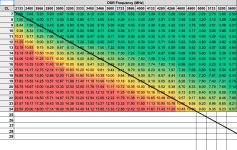I'm finding that my current DDR 3 1600 Mhz RAM can't handle some games like WD: Legions well. I know it's RAM speed related, as similar older DDR 3 machines get similar results in this game and others. My PC dips to ~45 FPS regardless of the settings used.
So, what I'm wondering at the moment is:
1. Should I build a new DDR 4 system this year, and get 2x 8GB ~4000mhz RAM for about £100, and a cheap Rocket Lake motherboard and 11700/ 11700F Rocket Lake 8 core CPU?
OR
2. Wait until DDR 5 (probably 2022), and build a powerful Zen 4 based PC? I think Alder Lake will be available in Q1-Q2 2022, and Zen 4, Q3-Q4 2022.
------------------------------------------------------------------------------------------------------------------------------------------------------------------------------
I have no idea how much DDR 5 RAM / motherboards will cost, and if DDR 5 will provide any tangible benefit vs high spec DDR 4 @ 4000 Mhz.
I recently brought a RTX 3070 FE and it's a bit of a beast for gaming, compared to my previous AMD R9 390, but it seems held back a bit by the slow DDR 3 RAM (maybe 4 core CPU too).
So, what I'm wondering at the moment is:
1. Should I build a new DDR 4 system this year, and get 2x 8GB ~4000mhz RAM for about £100, and a cheap Rocket Lake motherboard and 11700/ 11700F Rocket Lake 8 core CPU?
OR
2. Wait until DDR 5 (probably 2022), and build a powerful Zen 4 based PC? I think Alder Lake will be available in Q1-Q2 2022, and Zen 4, Q3-Q4 2022.
------------------------------------------------------------------------------------------------------------------------------------------------------------------------------
I have no idea how much DDR 5 RAM / motherboards will cost, and if DDR 5 will provide any tangible benefit vs high spec DDR 4 @ 4000 Mhz.
I recently brought a RTX 3070 FE and it's a bit of a beast for gaming, compared to my previous AMD R9 390, but it seems held back a bit by the slow DDR 3 RAM (maybe 4 core CPU too).
Last edited:




